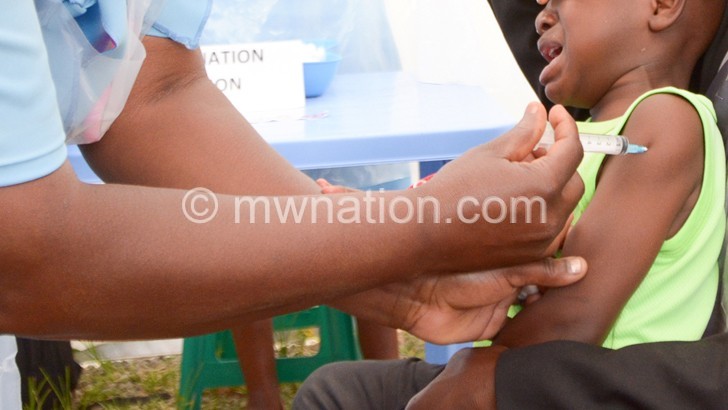Diarrhoea deaths down by 34% in Mchinji
Diarrhoea deaths among infants in Mchinji have dropped by 34 percent, according to a study.
Scientists from University of Liverpool, University College London (UCL), Johns Hopkins Bloomberg School of Public Health and partners in Malawi carried out the study.
According to the study’s results published on Saturday by The Lancet Global Health, an online health publication, the reduction in fatalities followed a rotavirus vaccination administered in Mchinji between January 1 2012 and June 1 2015 and analysing infants born within this period.

The publication further states that researchers found a direct link between the proportion of the population vaccinated and the reduction in mortality achieved.
“Malawi had a strong immunisation programme and was very proactive in planning to introduce rotavirus vaccine, which made it possible to scale up coverage rapidly,” reads the report in part.
The online publication quotes Ministry of Health chief of health services Dr Charles Mwansambo as having described the vaccine as important and that it must reach all children.
“Within a year from vaccine introduction, we were able to reach up to 90 percent of the population. It is vitally important that rotavirus vaccines reach all children, especially the most vulnerable living in poorer settings where the impact of vaccinations is greatest,” he said.
The health publication also quotes senior research associate at UCL’s Institute for Global Health, Dr Carina King, as describing the results as motivating.
She says: “This is encouraging because children from the sub-Saharan African region account for more than half of the global diarrhoea deaths and with over 30 African countries thus far introducing rotavirus vaccine, the absolute impact on mortality is likely to be substantial.”
According to Professor Nigel Cunlife from University of Liverpool’s Centre for Global Vaccine Research, rotavirus remains a leading cause of severe diarrhoea and deaths among infants and young children in many African countries and Asia; hence, the findings advocate for the incorporation of the vaccine in childhood immunisation programmes.
Diarrhoea caused 215 000 child deaths in 2013 with 121 000 recorded in Africa alone.
The vaccine was introduced in the country in 2012 and to determine its impact, researchers carried out a large population birth study of 48 672 infants.
The findings complement efforts by the World Health Organisation (WHO), which recommends that the rotavirus vaccine be included in all national immunisation programmes.
Wellcome Trust and Glaxo Smith Kline Biologicals funded the exercise. n





